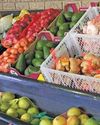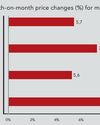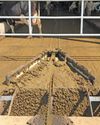
New research into rural small-scale farms in South Africa’s North West province has found that climate-smart farming techniques lead to better maize yields, a more regular supply of food for the farmers, and a wider variety of crops.
Small-scale farmers often produce primarily for their own consumption, but many also sell produce in local markets. Because small-scale farmers rely on their crops both to survive and as their only form of income, they are particularly vulnerable to the impacts of climate change.
Some of the climate-smart techniques being successfully used are:
Planting drought-tolerant maize seeds (a new variety of maize that grows well even when there is a drought);
Mulching (covering the soil with a layer of leaves or bark to keep the moisture in);
Cover cropping (planting grasses or legumes between the main crop to nourish and protect the soil);
Mixed cropping (growing two or more crops together to repel pests); and
Zero tillage (placing mulch over the soil and planting seeds in that layer instead of digging beds).
AN UNSTABLE ENVIRONMENT
North West has a semi-arid climate with hot summers and mild winters. More frequent and intense droughts and unpredictable rain have created an unstable environment. Traditional farming practices have become less reliable, underscoring the urgent need for adopting climate-smart agriculture.
Across South Africa, rural small-scale farming families are more vulnerable to climate change. They do not own expensive irrigation systems. These days, rain is often delayed. This means the small-scale farmers can no longer plant as early as they used to. This affects growing seasons and reduces their crop output, creating food insecurity in their households.
This story is from the September 06, 2024 edition of Farmer's Weekly.
Start your 7-day Magzter GOLD free trial to access thousands of curated premium stories, and 9,000+ magazines and newspapers.
Already a subscriber ? Sign In
This story is from the September 06, 2024 edition of Farmer's Weekly.
Start your 7-day Magzter GOLD free trial to access thousands of curated premium stories, and 9,000+ magazines and newspapers.
Already a subscriber? Sign In

Agripreneur wins top award for butternut coffee
Bloemfontein-based agripreneur Chantelle de Bruyn has achieved global recognition.

Final fresh produce inquiry pins low level of transformation on farming environment
The Competition Commission released its final report on the Fresh Produce Market Inquiry in mid-January, maintaining that transformation in the industry was being impeded by a lack of support for emerging farmers.

Illegal fishing in Australia reveals market gap for farmed sea cucumber
Illegal fishing practices in Australia have revealed a large market opportunity for sea cucumber farming.

An introduction to the Ford Ranger Tremor
In December 2024, the CAR magazine team received the Ford Ranger Tremor to accompany them through the festive season and into the new year. Oliver Keohane looks at what the Tremor is all about.

A farmer's experience with bush encroachment
Farmer David Addenbrooke has worked in the Zimbabwean beef industry for around four decades. Here, he relates his experience with bush encroachment and offers farmers some advice on battling this scourge.

Good rains boost SA's summer grain crop prospects
This week, Absa AgriBusiness analyses several market dynamics and shares its expectations for local grain and oilseed prices over the coming months.

A self-help tool for getting young people engaged in agriculture
The active engagement of the youth in agriculture is pivotal to the sustainability and growth of the sector. Empowering them with the necessary support is key to nurturing future farmers who are equipped to overcome future challenges like the effects of climate change.Dr Primrose Madende, researcher at the Department of Agricultural Economics at the University of the Free State

Rallying to the cackle of this raucous bird
The gregarious and territorial Green Wood-hoopoe, also known as the Red-billed Wood-hoopoe, is extremely vocal and is often heard before it is seen. And for very good reason,

SA coffee lovers can expect price increase
South African coffee prices are expected to spike sharply in the foreseeable future because of failed crops in the country’s main importing countries: Brazil and Vietnam.

Paving the way for a greener dairy industry
The dairy industry is often criticised for its environmental impact, but a new innovation called DESTiny aims to empower farmers to take control of their carbon footprints. Riana Reinecke, the tool's developer, explained to Glenneis Kriel how it works and how farmers can benefit from it.